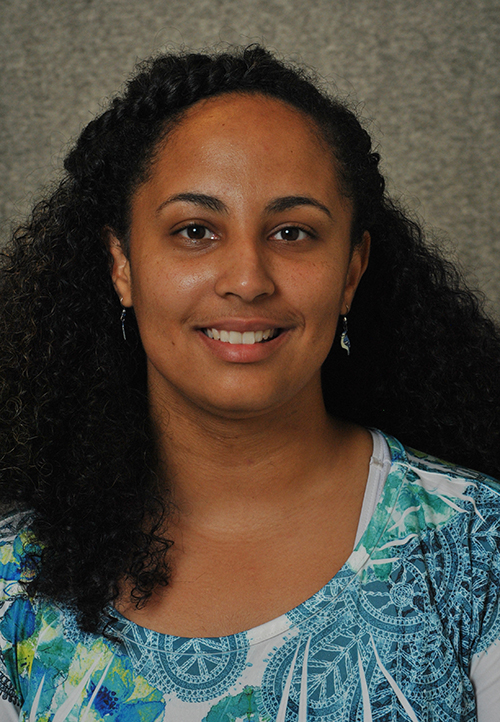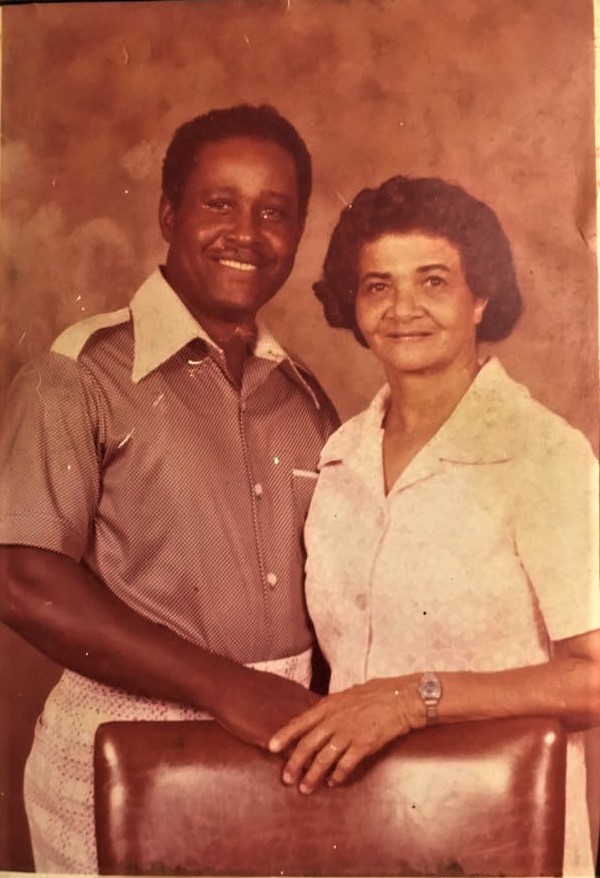Protecting communities, honoring family, and navigating a virtual internship
 Janiel Ahkin Chin Tai, 4th-year PhD student in PULSe and the School of Health Sciences, looks forward to a position with PepsiCo after a successful virtual internship.
Janiel Ahkin Chin Tai, 4th-year PhD student in PULSe and the School of Health Sciences, looks forward to a position with PepsiCo after a successful virtual internship.
She was inspired by her great-grandfather, an immigrant who feared the chemicals he was exposed to while working in a sugarcane field. She’ll be the first person in her family to graduate with a PhD and has already landed a job at a Fortune 500 company. This is Janiel Ahkin Chin Tai’s next giant leap.
Ahkin Chin Tai is a 4th-year PhD student in the Purdue University Life Science (PULSe) program and the School of Health Sciences. She was recruited to Purdue through Purdue’s Post-Baccalaureate Research Education Program (PREP) and stayed for her PhD. She is also an Alliance for Graduate Education and the Professoriate (AGEP) scholar. She was motivated by family history to study toxicology in the Developmental Toxicology Lab of Purdue professor Jennifer Freeman. Ahkin Chin Tai interned remotely at PepsiCo through the pandemic and will start her career there as a Senior Scientist after graduation. This is her story in her own words.
Tell us about your research goals.
My research in Dr. Freeman’s lab uses zebrafish as a model organism, since they have high similarity in disease homology with humans. This is research that is implicated with human health relevance. We study toxicants and I specifically focus on atrazine. Atrazine is an herbicide that is commonly applied around the world, but within the United States it’s very heavily used within the Midwest, including Indiana. It’s typically used on cornfields, sorghum, and sugarcane.
My work focuses on understanding how a developmental exposure to atrazine can affect the individual and subsequent generations. I do a variety of assays but overall, I look at changes in morphology, behavior, and genetics to understand health risks. Metabolites from this chemical can be detected in human urine and in other model organisms. Dr. Freeman and I recently published a paper detecting major atrazine metabolites in fish tissue, which was novel and exciting. We’ve also seen developmental health outcomes, particularly neural health outcomes such as behavioral abnormalities and changes in the dopaminergic system. That’s a reason why we’re concerned about studying this chemical.
What inspired you to pursue this research?
There were a variety of reasons why I chose this research, particularly as a woman of color. Toxicology is such an important field from a community standpoint. When we look at who tends to get exposures to chemicals, we’re often looking at underserved communities and communities of color. And, you know, it’s not just atrazine. My lab also studies lead. We have a student who’s looking at lead exposure and its complications, which is really important information for communities near lead factories. That community aspect is significant to me.
My family is an immigrant family, and my great-grandfather had a dream for trying to pull our family into a better financial situation through educational opportunities. He came to America to work on a sugarcane field to send money back home. He would tell me how he and the other workers were scared of the chemicals they were mixing on site in the field because they didn’t know what the health consequences were. Sometimes folks would get sick and not return to work the next field season, which left people anxious. Grandaddy felt like he had limited options because he was a man defined by the time: a black man from a humble background in a developing country with limited educational opportunities. He had to make the decision between his health and his family’s future. He ultimately chose family, because his dream was to be a medical doctor, but he just didn’t have the resources to pursue this dream. It’s been decades, because my great-grandfather is quite old now, but he’s never forgotten how he felt working in that field, or his dream.
It was important to me to get closure for my family and pursue my grandaddy’s dream. I purposefully chose this lab and atrazine because, even though I don’t know what my great-grandfather and the other field workers were potentially exposed to, atrazine is a chemical that is used in sugarcane fields. It’s a few generations late, but I’m so happy to say as I finish my degree, because of grandaddy’s dreams and sacrifice, we will have two doctors in the family now: me, the first PhD and TJ, my cousin back on the island who is the first MD.

Janiel Ahkin Chin Tai’s great-grandfather Rupert (left) who inspired her to pursue research in toxicology, and her great-grandmother Ilene (right)
What has your experience in AGEP been like?
It’s been a really great program, providing a sense of community, family, support, and professional development. We have meetings and get to support and encourage each other. It’s nice to be in a space where there are other PhD students who understand what you’re going through. There’s also a chance to mentor students and help them get adjusted to research settings. This year we held a day-long event for people who were interested in going to Graduate School, particularly PhD programs. And it was not only at Purdue. We were really focusing on accessibility. We gave them a chance to ask questions at the end, which I think was valuable. I thought I knew a lot about going into a PhD, but each program is so unique, and each degree is so unique that you never fully know what you’re getting into until you’re in it. But you can always have more information.
What was your experience completing a fully virtual internship at PepsiCo?
I was originally supposed to intern for Pepsi for three months, but the internship was shortened. They had me look over a document called GRAS (Generally Regarded as Safe), which is an overall assessment of any health studies that have been done on a given ingredient. The one that I worked with was a little over eighty pages. I fortunately finished the document and was able to make my assessment, which I presented at the end of the internship.
In addition, there was an exciting aspect that was unique to the virtual format, where we worked on a team with folks across different fields in the company—across marketing, across HR, and law. Together, we innovated new ways of marketing and selling a particular hot item that the company was very interested in marketing toward college age students. I think that was a really unique experience to learn from other folks. There was also competition that was virtual, and I met some great people there too. Overall, the internship went well.
How did your research prepare you for your internship with PepsiCo?
In the lab, we have an emphasis on teamwork that I think is essential. My advisor pushes all her students to be the best versions of ourselves. In a lot of academic settings there is emphasis on the individual, but we have animals that we take care of as a group in lab, and we have to function as a team. This was great preparation because when I did my internship with Pepsi, I was not a free agent by any means. I was working on a team of about nine individuals, including myself. Seven of these individuals had toxicology PhDs. The other person had an organic chemistry degree.
My advisor also encourages students who are entering the lab to do a book chapter, as well as a review chapter to make sure we are prepared with the ability to read and understand vast amounts of literature, which was a great skill as I was doing risk assessment on Pepsi’s new products. As a research scientist, it’s important to be able to review work from a critical standpoint.
What advice would you give current students who may be searching for internships or who have been accepted and are wondering how to excel in their role?
I think it’s important to be your most authentic self and to bring your full professional self to the table. This is a chance not only for the company or academy to see if you’re a good fit, but also for you—they are interested in recruiting you. If you don’t bring your full self, how will you know if you are truly comfortable in that environment or not? And I think it’s really important to go in with an open mind and positive attitude, as well as to follow up with people and be personable. I was encouraged to take the networking aspect of my degree seriously at the start of my academic career here at Purdue, and I definitely see that has paid off.
Tell us about the outcome of your internship with PepsiCo.
Pepsi was interested in expanding their team from the beginning of the internship, and they let me know that the internship was a chance to see how I would perform on the job and how I would interact with the rest of the team. During the internship, they told me that they thought I would be a really great fit for the team and that they were interested in hiring me. I told them I was very interested, but that I had to have a conversation with my boss first before getting back to them. I think it was a bittersweet moment because my advisor was excited, but we had some experiments planned that we were really looking forward to working on together. But she is happy for me, and I think she’s proud. I’m supposed to be starting the job August of 2021!
Learn more about Janiel Ahkin Chin Tai: www.purdue.edu/gradschool/pulse/profiles/tai.html